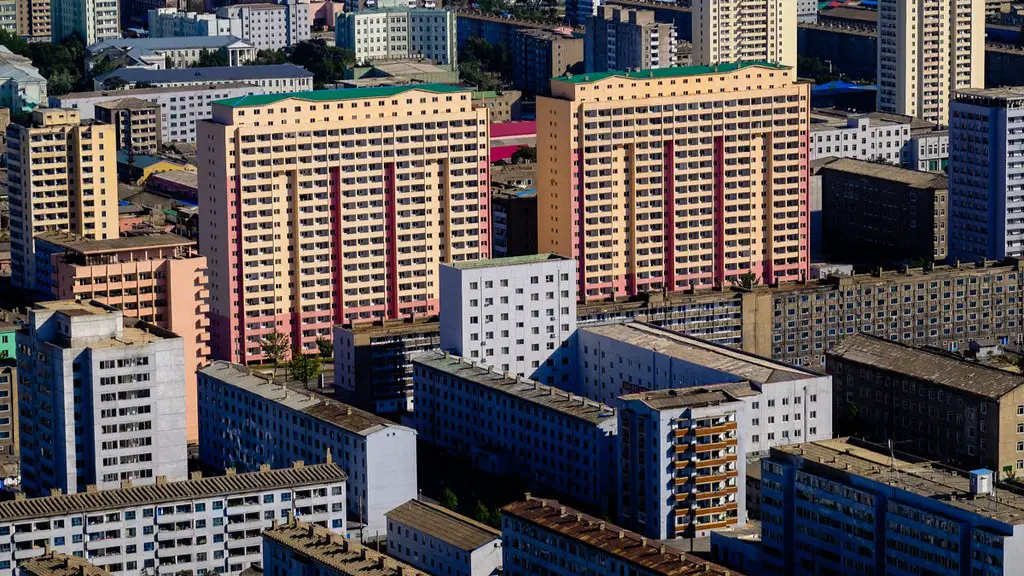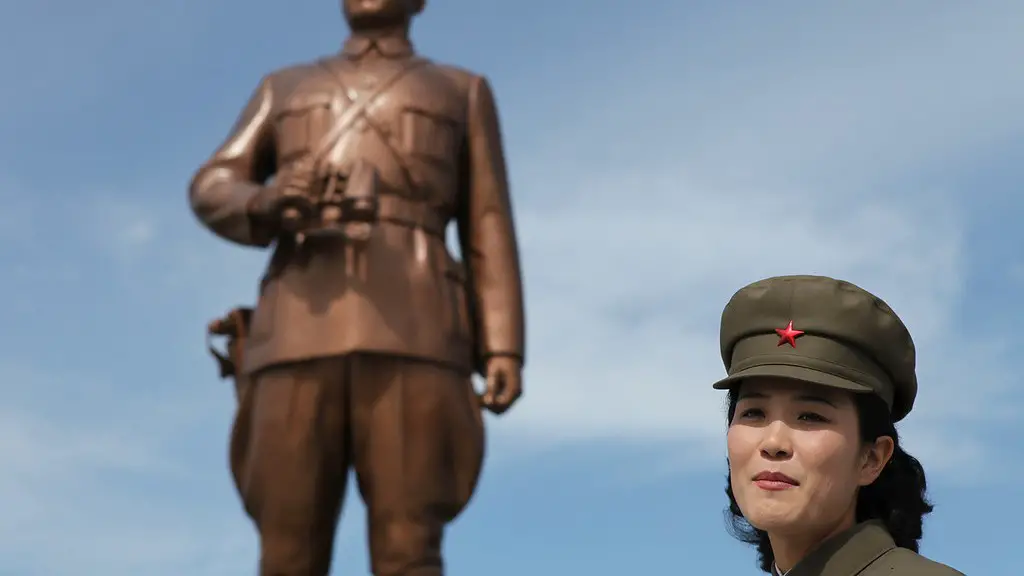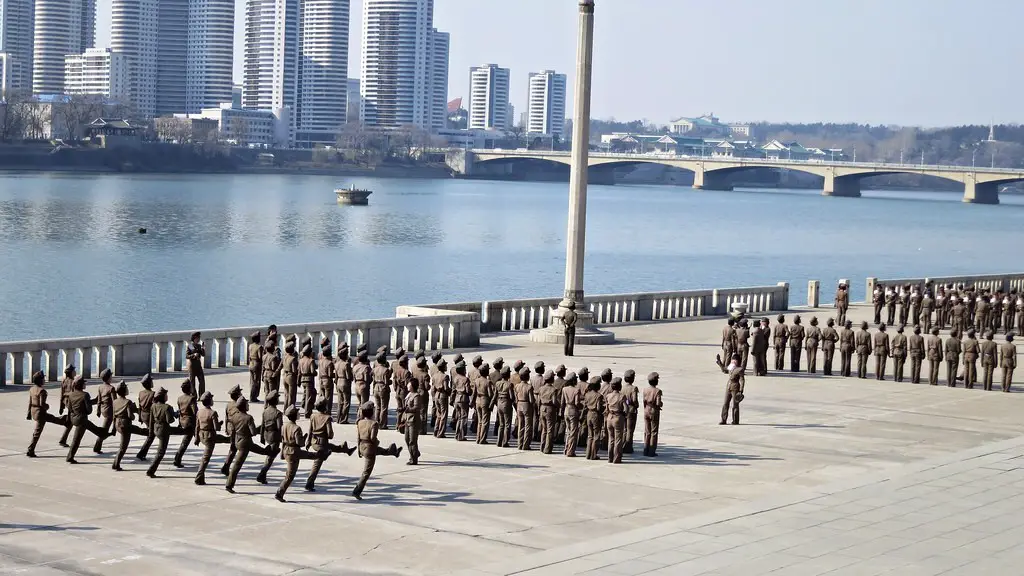Economic Problems
North Korea is an isolated country, surrounded by some of the most economically advanced nations in the world. Its economy is weak and since the early 1990s, the country has been enduring economic hardship due to widespread famine and food shortages. The North Korean government has failed to provide adequate food security, resulting in malnutrition and extreme poverty. North Korea is heavily dependent on foreign aid to feed its population but it cannot depend on aid indefinitely.
The government’s attempts to boost the economy and increase food production have largely been unsuccessful. North Korea’s agricultural sector has suffered from a lack of capital and technological advancements, rendering farmers unable to use new techniques to increase yields. As a result, agricultural productivity has been very low and even stagnated in some cases. Much of the country’s land has been deforested and soil fertility is very low, limiting the amount of crops that can be grown.
The country faces frequent droughts and floods, with intense variations in temperature, resulting in the failure of the harvest. This creates further shortages of food. Additionally, the country does not have access to sufficient water for irrigation and its water supply is heavily polluted. The government has not taken sufficient steps to conserve water, resulting in lack of access to clean water for many North Koreans. As a result, it is becoming difficult for North Korea to meet the basic needs of its citizens.
Government Policies
North Korea’s government has not taken sufficient steps to address the food insecurity in the country. It continues to prioritize the military over essential needs such as food production, diverting valuable resources away from the agricultural sector. The North Korean government has also limited private enterprise and imposed limits on investment into agricultural production. This has hindered any attempts to supplement the country’s food supply.
Moreover, the North Korean government has imposed policies that have contributed to food insecurity. It has resisted reforms that would have improved the access to food and resources for its citizens, such as allowing farmers to sell their produce on the market. These policies have prevented farmers from increasing their output.
The government has also failed to provide its citizens with access to the necessary resources such as fertilizers, seeds, and tools, making it nearly impossible for agricultural productivity to increase. It has also been reluctant to adopt modern farming techniques and has favored large-scale farming projects that have proved ineffective at increasing productivity.
Sanctions
The United Nations has imposed economic sanctions on North Korea in an effort to pressure the government to reduce its nuclear weapons program. These sanctions have had an indirect effect on food production, as essential resources such as fuels and fertilizers are now more difficult to obtain. Additionally, the sanctions have made it more difficult for North Korea to export and import essential goods, such as food and medicine.
These restrictions on the North Korean economy have exacerbated the country’s existing economic and food problems. The sanctions have hindered North Korea’s ability to procure necessary supplies from abroad, preventing it from increasing its food production. The sanctions have also been detrimental to the country’s economic development and have worsened the poverty and malnutrition among the citizens.
International Aid
To offset the effect of the sanctions, some countries have provided aid to North Korea. These countries have provided food and medical supplies to help relieve the country’s food shortages. However, the aid is limited and it is not enough to cover the needs of the entire population.
Moreover, international aid organizations have provided technical assistance in an effort to boost North Korea’s agricultural production. They have encouraged the North Korean government to embrace modern farming techniques and they have provided support to farmers in the form of training and resources. The international aid organizations have also encouraged the government to reform its policies in order to increase food production.
Despite these efforts, North Korea remains heavily dependent on foreign aid to meet its food needs. It will require significant investments in agricultural technology and infrastructure in order to increase food production, but the North Korean government has failed to address these needs.
Climate Change
Climate change has created additional challenges for North Korea’s agricultural sector. The higher temperatures have resulted in more frequent droughts and floods, which have caused crop failures and hindered food production. Climate change has also resulted in changes in the soil composition and quality, which have further reduced crop yields.
In response to the effects of climate change, North Korea has taken some steps to develop its agricultural infrastructure, such as improving irrigation systems. However, these efforts have not been sufficient to prevent the effects of climate change from hindering food production.
Long-Term Solutions
In order to address the food shortages and economic difficulties in North Korea, the government needs to take immediate and long-term actions. It should invest in the agricultural sector and modernize the farming sector by introducing new technology and methods. It should also encourage private ownership of land and allow farmers to sell their produce on the market.
The North Korean government also needs to promote education and access to technology, as this can help increase food production. Additionally, the government should recognize the effects of climate change and put in place policies to reduce its impact on the agricultural sector.
The international community can also help by encouraging reforms in the North Korean government and by providing resources and technical assistance. This could support North Korea in its efforts to increase food production and improve food security.
Production of Non-Food Crops
The North Korean government should also consider generating additional income by producing and exporting non-food crops. These crops do not need to be heavily fertilized or irrigated and could be grown in areas where food crops cannot be cultivated. By doing this, the North Korean government could generate additional income, which could be used to invest in the agricultural sector, improving food production and increasing access to essential resources.
Furthermore, the government should consider growing plants for biomass and bioplastics, which can help reduce the country’s reliance on imported goods. Growing these crops could generate income without putting a strain on the country’s natural resources.
Making Education Accessible
The North Korean government should also make education accessible to more of its citizens. This could help increase the productivity of the agricultural sector by providing farmers with knowledge and skills related to modern farming techniques. Additionally, educational programs can help raise awareness about sustainable farming practices, which could help reduce the impact of climate change and increase food production.
Conclusion
In conclusion, North Korea cannot grow enough food to meet the needs of its population due to its weak economy, restrictive policies, and sanctions imposed by the international community. To solve this problem, the North Korean government needs to invest in the agricultural sector and take measures to reduce the effect of climate change on food production. Additionally, the international community can play a role by providing aid and technical assistance to the North Korean government. By taking these steps, North Korea can increase food production and improve food security.


